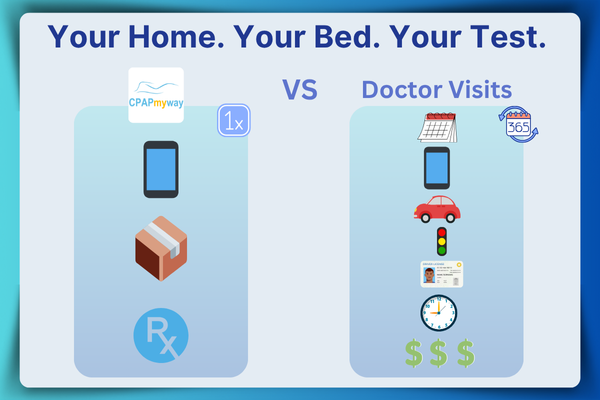CPAPmyway
Product Code : Home Sleep Apnea Test-01
Brand : CPAPmyway
Availability:
Couldn't load pickup availability
 In stock, Ready to Ship
In stock, Ready to Ship
 Fast, FREE Shipping On Orders Over $49
Fast, FREE Shipping On Orders Over $49
 Secure Payments
Secure Payments
 100% Satisfaction Guaranteed
100% Satisfaction Guaranteed
Product Description
Product Description
How it Works:






Get tested in the comfort of your own home for Sleep Apnea with this easy-to-use test kit. The kit arrives at your door in a matter of days which makes getting results a quick process. You must perform and return the test within 2 days of receiving it to avoid late fees. Depending on test availability, you could have results in less than a week. It's time to find out if that snoring that rattles your windows might be a bigger problem than you thought. Good news is that this test is easy to perform, and the solution (if needed) is easier and more comfortable than you thought as well.
When you purchase this item, we will process your order within 1 business day. We will email you a link to the Instructional Video that will illustrate the exact way to perform the test. Also included is a return label for the test so that you can send it directly back to us after completing it. We then forward the test to a Board-Certified Sleep Doctor that typically has your results back to us within 1-2 business days.
This Test will meet the DOT Health Card Criteria.
Select 2-day shipping on checkout and cut 4-6 days off the process.
Time Frame/How Long does the Sleep Test take?
Ship times may vary due to shipping delays. The average time frame from shipping to results of the Sleep Test is 10-12 days. In normal shipping conditions the Sleep Test is shipped within 1-2 days of your order. It will arrive in 3-4 business days with standard shipping selection. It is expected that the test will be completed within 2 days of receiving the test kit. If it is not taken within 2 days, the order will be subject to a $25 per day late fee. The return shipping is prepaid and will also be 3-4 business days. Once the test arrives back at the CPAPmyway office it is immediately forwarded to the Sleep Physician assigned to your test. The Sleep Physician has the results back to us in 1-2 business days. The 2-day shipping option can be added in the checkout process for $35 and will cut 4-6 days off of the process.
Time Limitation and Fees
You will have 2 days to perform the test once you receive it. If it is not returned in the required time period, you may be subject to a $25 per day late fee. This fee may be automatically charged to your payment method. Additionally, if the device is not returned you will be charged a purchase price of $3000. If there is any factor that prevents your timely return of this device the Customer Service team at cs@cpapmyway.com must be notified by email.
CPAPmyway
RELATIONSHIP WITH YOU:
CPAPmyway is not a healthcare provider
and is not licensed to engage in the practice of medicine. We offer services
exclusively on a cash-based only platform which services are limited to the non-clinical
administrative coordination, triage, scheduling and courier services to
facilitate your access to the independent healthcare providers we work with. No
Physician-Patient relationship is created between you and CPAPmyway as a result
of this transaction. If you prefer to receive and pay for these healthcare
services and supplies using insurance, CPAPmyway cannot offer these services to
you. You are free to seek the medical care and supplies you need through
another platform/ service provider.
What if I have already been Tested and Diagnosed with Sleep Apnea?
If this isn't your first rodeo with Sleep Apnea and you are simply trying to update your CPAP Equipment or replace a CPAP that is broken, we have a quick and easy CPAP Prescription Service that will save you some time and Money. If you have already been diagnosed and just need to get an updated CPAP Prescription please click here to learn about our CPAP Prescription Service.
Check out the Instructional Video
***Once the Home Sleep Test has been packaged and shipped to you there are no refunds***










